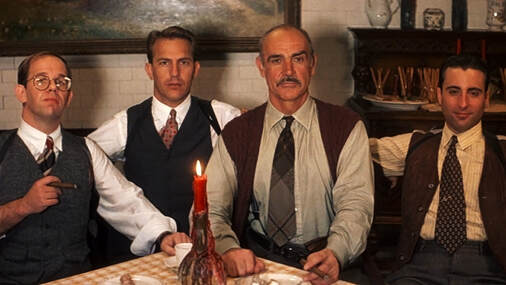B- | A green Treasury agent assembles a team to take down Al Capone. Directed by Brian De Palma Starring Kevin Costner, Sean Connery, and Robert de Niro Review by Jon Kissel |

Outside of the dialogue, Mamet’s not distinguishing himself as the great writer he so often is acclaimed as. A playwright first and foremost, his script for the Untouchables feels like an elementary-level intro to screenwriting. The plot happens in predictable phases, such that the thin characters all feel like they’re moving on rails to the next act or scene. This is an inorganic and deeply simplistic take, a throwback of the crime movie to a period of Hollywood history where the bad guys weren’t allowed to be too charming or too interesting lest anyone in the audience sympathize with them. It’s more a John Wayne Western than a gangster flick, the kind of film where the heroic protagonist can earnestly say the law is wrong but I’m going to enforce it as much as possible, and then go home to his empty shell of a fawning wife played by Patricia Clarkson, an actor with as much talent as anyone else in the cast. The supportive cop-wife cliché in South Park is deeper than Catherine Ness.
On the other hand, a predictable, on-rails script can work in the right hands, but De Palma’s aren’t those hands. Somehow, for a film with a significant body count, the action feels without stakes. The shootouts are oddly gleeful. The film can either portray accountant-turned-agent Oscar Wallace (Charles Martin Smith) as an office nerd or as an efficient killer. Going for both doesn’t make any sense and makes the gangsters seem less dangerous. The steps sequence is a blatant ripoff of a better film from almost a hundred years ago, and I hated the final action beats in the courthouse, mostly for how absurd the whole thing is. Another part of the flimsy feel of the film is, and I hate to say it, Ennio Morricone’s adventurous score. The tracks with harmonicas and drums and strings are quite good, but the tracks backing, for instance, the Canadian bridge confrontation mark the film as some kind of epic romp when it’s not that at all. A little girl is blown up in the second scene. The tracks backing Ness’ home life are worthy of a soap opera, not one of the greatest composers to ever live.
The most surprising thing about The Untouchables is how empty it is. There’s very little here beyond a reasonably competent action film whose influence is a little gross. Ness bends all his rules that he professes to follow in the beginning and suffers no consequences for having broken them. If anything, thanks to the deaths on his crew, he should’ve broken more rules and potentially kept them alive. It’s all more of the renegade cop genre that I increasingly find poisonous. The rules are for saps and will never allow the good guys with guns to catch the bad guys with guns, and therefore must be jettisoned whenever necessary, as deemed by the cops. The untouchables in real life aren’t incorruptible heroes but corrupted cops who imitate these kinds of archetypes and evade punishment. C
 RSS Feed
RSS Feed